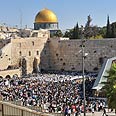
Jerusalem's Old City
צילום: גיא אסיאג
The case for Israel
Op-ed: Our roots here traced back to 13th Century BC, 3,350 years before PLO’s creation
Since Oslo, 1993, the case of the Jewish State has highlighted Israel's pursuit of peace and security, while downplaying the right/deed of the Jewish People to its historical homeland. A resounding rebuke of David Ben Gurion, the Laborite Founding Father of the Jewish State and its first prime minister, who stated: "He who abandons his past forfeits his future.”
The claim of national sovereignty and the level of steadfastness in face of adversity are derivatives of the attachment to the territorial cradle of history and national security requirements.
Nations which highlight their non-conditional attachment to their territorial cradle of history (irrespective of diplomatic, security and economic considerations) enhance steadfastness and gain strategic respect. On the other hand, nations which consider their cradle of history a negotiable-real-estate may gain short-lived popularity, but undermine their attachment to the land, lose long-term strategic respect and erode their own posture of deterrence.
A nation which negotiates away its cradle of history is giving away its future.
Prof. (emeritus) Menasheh Har-El, a leading expert on the history and geography of the Land of Israel, a recipient of the Israel Prize and author of 13 books, documents national Jewish roots in Judea, Samaria and Jerusalem as early as the 13th century BC: 2,000 years before the appearance of Islam in the Arabian Peninsula, 3,200 years before Arabs from Egypt, Syria and Lebanon migrated to the Land of Israel and 3,350 years before the establishment of the Palestine Liberation Organization.
According to Professor Har-El's 55 years of research, the Jews were the first to coalesce the various regions of Canaan into a unified country. They settled in the mountain ridges of Judea and Samaria rather than along the coastal plain, introducing agricultural innovations into barren, rugged mountains, developing irrigation systems, establishing stone and metal shops, ushering advanced architecture and construction, building roads from the Mediterranean to Jerusalem, which became the crown jewel of the Jewish people.
Jerusalem neglected by Arabs
On the other hand, Har-El notes, Jerusalem was severely neglected during the Islamic rule of the area, overshadowed by the town of Ramlah (half way between Tel Aviv and Jerusalem), which was the provincial Muslim capital. The Muslim attitude toward Jerusalem - the capital of the Jewish people since 1,000BC - reflected the negligible priority accorded by Islam toward the Land of Israel, which was devastated by Muslim rule.
In 1867, Mark Twain attested to the state of the area in Innocents Abroad: "…Of all the lands there are for dismal scenery, Palestine must be the prince…It is a hopeless, dreary, heart-broken land…Palestine sits in sackcloth and ashes…Palestine is desolate and unlovely…."
The 1949-1967 Jordanian occupation of east Jerusalem sustained the Muslim attitude toward Jerusalem. Jordan oppressed Jerusalem's Christian community, which was reduced from 25,000 in 1949 to 10,000 in 1967. The Hashemites coerced Jerusalem's church schools to teach the Koran and prevented Christian expansion. Jordan defiled and vandalized over 50 Jewish synagogues, using some as cowsheds, stables or public latrines. Over 75% of the tombstones at the holiest Jewish cemetery, on Mount Olive, were ripped out and used for pavements and public urinals.
Jerusalem was never a capital of any Arab entity. It was not mentioned in the 1964 PLO's Covenant. However, Jerusalem is highlighted in each synagogue, each Jewish prayer and holiday and during every Jewish wedding and other Jewish rituals. Jerusalem is a pillar of Judaism, but it is not included among the five pillars of Islam. Jerusalem – and its synonym, Zion - are mentioned 821 times in the Bible ("Old Testament"), but not even once in the Koran.
Muhammad never set foot in Jerusalem or in the Land of Israel. In contrast to Jews, Muslims pray toward Mecca and Medina and not toward Jerusalem and there is no Muslim pilgrimage to Jerusalem, but to Mecca.
The territorial cradle of history constitutes the foundation of national moral high-ground. As essential as is the topographic high-ground (e.g., the over-towering mountain ridges of Judea and Samaria) to national security, the moral high-ground is significantly more critical to national survival. The devotion to the Land of Israel in general – and Jerusalem in particular - has played a critical role in preserving the Jewish people!
- Follow Ynetnews on Facebook










